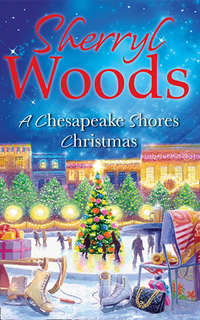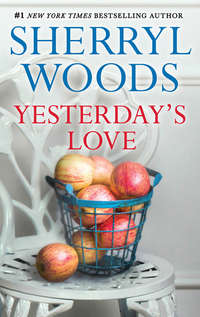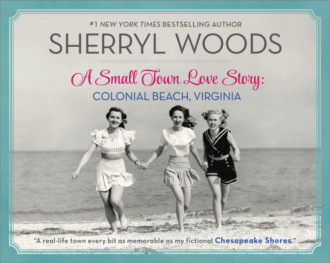
Полная версия
A Small Town Love Story: Colonial Beach, Virginia

A Small Town Love Story: Colonial Beach, Virginia
Sherryl Woods


To that old gang of mine:
Mike Gill, Sue Gill, Mike O’Neill, Marge Owens
and gone far too soon—Patti O’Neill and Bob Owens
Those were, indeed, the days!

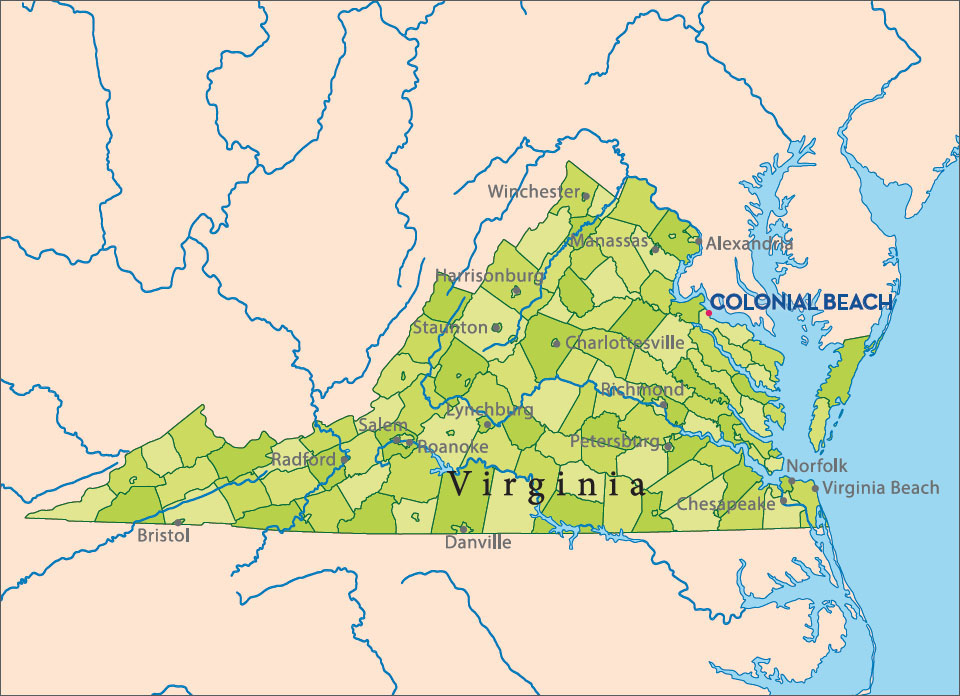
TABLE OF CONTENTS
ACKNOWLEDGMENTS
FOREWORD
A LOOK BACK: A COLORFUL PAST, A QUIRKY PRESENT
Remember When: Jackie Shinn
A Naval Neighbor
A Story of Family and Farming: Mildred Grigsby
The Family Farm
A Lifetime of Friendship: Jackie Curtis and Jessie Hall
Serving Community and Country: Carlton Hudson and Pat Fitzgerald
Changing Times: Burkett Lyburn
Right Side of the Law: Michael Mayo
A Whole Different World: The Sydnors
A LOAF OF BREAD, PENNY CANDY…AND FREEDOM
A Long Line of Merchants: The Densons
From King Cotton to Penny Candy: Marguerite Staples
Business Reality: Potomac Sunrise
THE TOWN’S WELCOME MAT: FROM GRANDEUR TO COZY B AND Bs
Make No Mistake, It’s a Motor Court, Not a Motel: Ellie Caruthers
BY THE SEA, BY THE SEA
A Life Built Around Oysters: The Curleys
Sand in their Shoes: The Mears Family
A Fish Tale: Alberta Parkinson
A Come-Here Who Stayed: Diana Pearson
Building Boats…and a Future: Mary Virginia Stanford
Muskrat Ramble: Mike Stine
Creating a Small-Town Atmosphere: The Potomac River Festival and More
THE OYSTER WARS
A Night That Ended in a Hail of Bullets: Pete and Sugie Green
FOOD FOR THE SOUL
A Name Synonymous with Seafood: The Wilkersons
LAS VEGAS ON THE POTOMAC
Gambling on a Dream: Sandra Conner Scroggs
A COMMUNITY’S SPIRIT
Drifter Pride: Wayne Kennedy and Steve Swope
AFTERWORD
PHOTO CREDITS
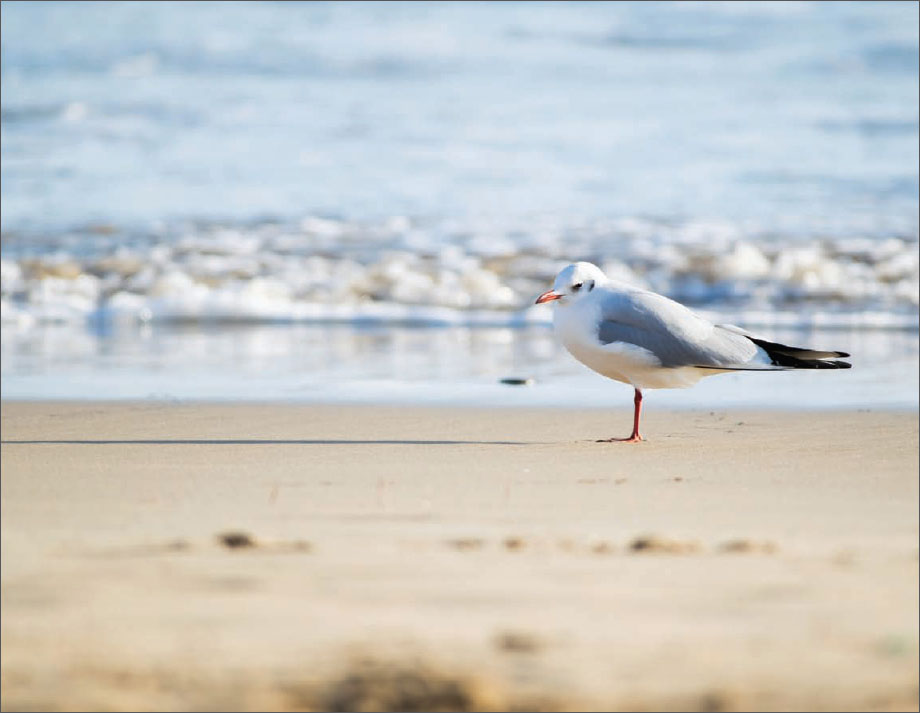
ACKNOWLEDGMENTS
I’ve had a lifetime to get to know the people of Colonial Beach, but never have I had more fun and met more characters than in the months when I was working on this book. I need to thank Kitty Norris, head librarian at the Cooper Branch of the Central Rappahannock Regional Library, who started me on this journey by mentioning that there were so many stories in town that needed to be recorded or written down. She provided endless assistance and cheerleading to get this job done, as did so many of the people you’ll meet in these pages: Ellie Caruthers, Jackie Curtis, Jessie Hall, Alberta Parkinson, Diana Pearson and Mary Virginia Stanford, who were always ready with a bit of town history, a new name for our ever-growing list of possible interviews and a whole lot of laughter. A special thanks to Frank A. Alger Jr., who recorded many of our sessions and created an oral history of Colonial Beach that will provide a lasting resource for those who come after us.
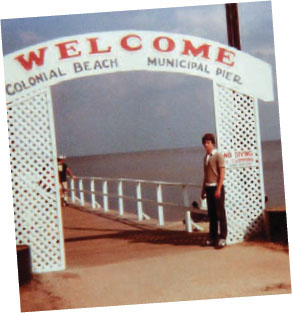
I couldn’t possibly have gotten to everybody on our list, including some dear friends who are incredible storytellers in their own right—my favorite electrician, William Hall, and his wife, Joyce, the Reverend Ron Okrasinski, longtime pastor of St. Mary’s Episcopal Church (who’s so great at eulogies, residents often seek him out to do theirs no matter their denomination), Larry and Andrew Groves, who entertain me with stories on a regular basis, childhood friend Marge Owens and her mom, Mary Burnley Owens. Marge played Drifters basketball, and Mary Burnley worked for the Texaco distribution company owned by John Ware for many, many years. The list is endless.
Even though there are so many more with stories to tell, I hope this book captures at least the essence of what makes Colonial Beach so unique and special for me and for many of those I spoke to.
Even more, I hope it will resonate with many of you who long for a simpler lifestyle. Most of all, perhaps, I hope it will encourage you to talk to those in your family or in your town who have wonderful stories to share. Get them down before they’re lost.
In the meantime, welcome to my world.
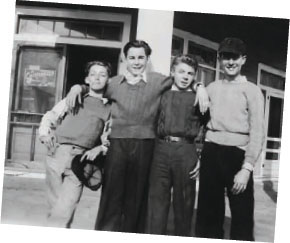
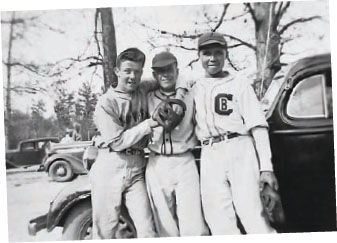
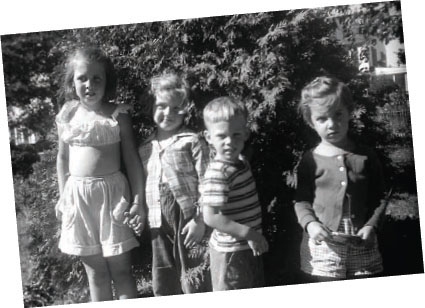
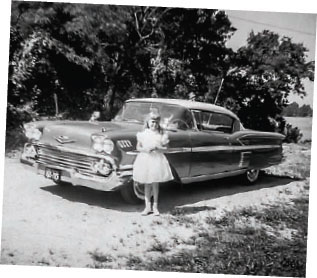
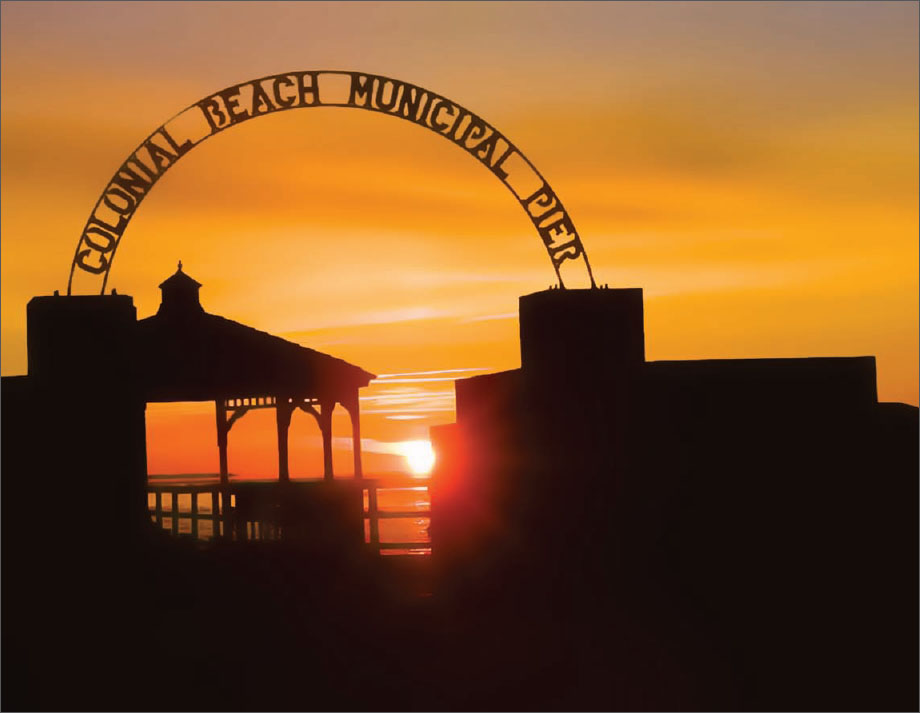
FOREWORD
I grew up in Arlington, Virginia, the very large suburb of Washington, DC, but I was blessed from the age of four by the privilege of spending my summers at a beach cottage in the very small town of Colonial Beach, Virginia. Our house had a wraparound porch, and what I remember most from those early years was riding my tricycle off the edge of the side porch, out of the view of my parents. Or not.
So many stories from those days were exaggerated, embellished or flat-out never happened, but it was summer, and family—parents, grandparents, aunts, uncles, cousins and family friends—was crowded on to benches around a long, banquet-length table in a huge dining room, windows open to the hot breeze, as we cracked piles of Maryland blue crabs. The air was thick with the scent of honeysuckle and the salty bite of the nearby Potomac River. Stories and laughter—along with an antique splatterware coffeepot filled with some sort of “adult” beverage—abounded.
By my teens I had become one of the town’s summer kids, though most of my friends were year-round locals. It seemed to me from those lazy, idyllic days that they were incredibly lucky to live in a small town. I wanted desperately to live there, too. I, in my youthful and only-child exuberance for what was best for me, thought that my mother should be happy to give up her career at a direct mail advertising agency to work as a waitress at one of the town’s gambling casinos, and that my dad, who worked for the Alcohol and Tobacco Tax Division of the Internal Revenue Service, could surely find work at the nearby Naval Surface Warfare Center at Dahlgren. Suffice it to say, they were not impressed by my plan.
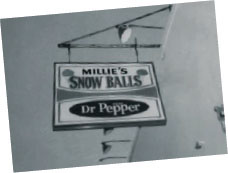
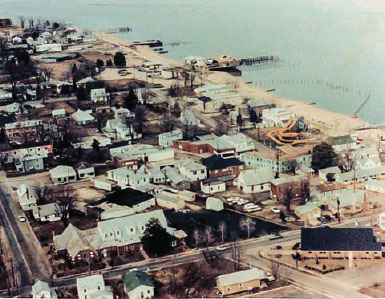
Aerial view of Colonial Beach
Undaunted, I continued to beg the adults in my family to accompany me on lengthy summer stays, so I could spend my days on the beach with my friends, snag a lime or cherry snow cone in the evening on the boardwalk, play an endless number of surprisingly energetic card games and bake countless pizzas in an old gas oven we’re lucky didn’t blow up the house. Drives around the “Point,” where the Potomac River meets Monroe Bay, were an almost daily ritual. In fact, that drive is so ingrained in the lives of many residents that their funeral processions take it one last time.
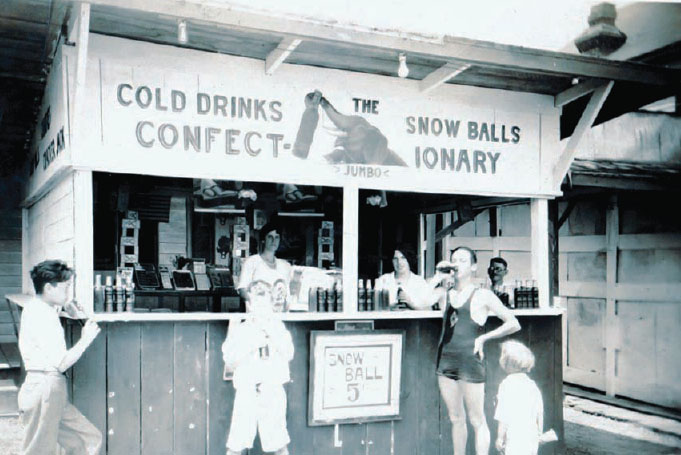
The Jumbo Stand on the boardwalk
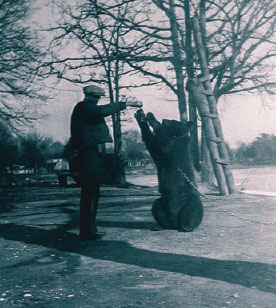
At Curley’s Point with Pete the Bear
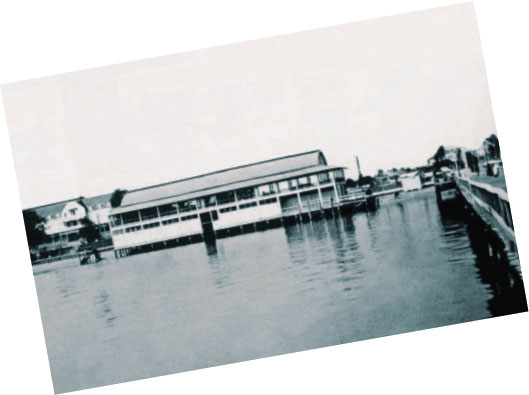
Palm Gardens Dance Pavillion and Hotel
Those years and those friends, plus all those lasting memories, created a lifetime love affair for me with small towns everywhere. Every book I’ve ever written in a small town setting was inspired in one way or another by Colonial Beach, Virginia. A couple of my series, in fact—the Trinity Harbor trilogy and more recently, my Chesapeake Shores series, which topped bestseller lists as novels and TV ratings charts for Hallmark Channel—were set in this very same region and borrowed from at least some of my experiences over the years.
Colonial Beach has an incredibly unique history, dating back for more than one hundred years in an area that produced the likes of George Washington, James Monroe and Robert E. Lee. Steamboats and ferries brought visitors from Washington, DC, Baltimore and Northern Virginia to stroll a boardwalk crammed with entertainment venues for dancing, dining, bowling and roller-skating.
There was a love-hate relationship with the gambling casinos and the crowds they brought in the 1950s. Watermen thrived with the abundance of crabs, oysters and rockfish. Local farmers brought truckloads of produce through town, stopping at the homes of their regular customers with everything from tomatoes and string beans to cantaloupes, watermelon and peaches. I loved those tomatoes so much that I used to make my father send them to me via FedEx for my birthday every July when I was living and working fulltime in Miami.
Then the casinos were outlawed in 1959. Around the same time, the famous Oyster Wars were fought between the oystermen and the authorities over the dredging of the beds in the Potomac and the Chesapeake Bay. By the ’60s, the town had reverted to a quiet, sleepy place that has struggled to find a new identity. While I missed the steamboat and ferry era—I’m not quite that old, after all—I was here for the gambling years, the dramatic ending of the Oyster Wars and every transition that has come since.
Over the years, coming back again and again to the house by the river—rebuilt now into a year-round home, but with a porch and river view and even some neighbors that remain mostly unchanged—I’ve discovered that I am far from alone in my love for this place. This town of fewer than five thousand full-time residents is filled with people who were born here and saw no reason to leave, people who left and came home again, and those who came here, fell in love with the place or a person and never left.
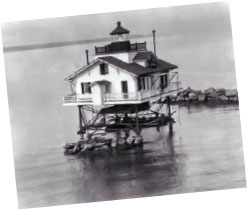
Cedar Point Lighthouse
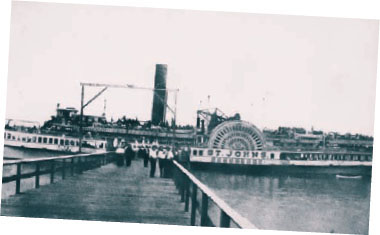
St. Johns at the pier
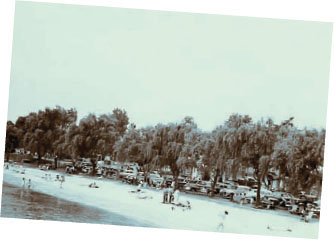
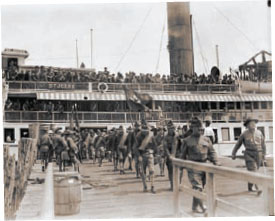
Soldiers disembarking the St. Johns
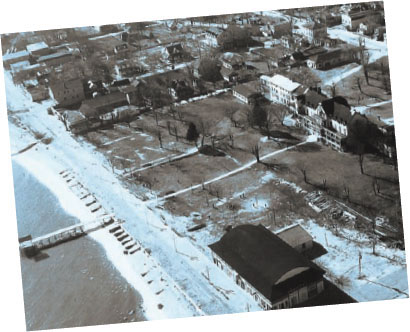
Aerial view of Colonial Beach Hotel, 1920s
Sounds a bit like a romance novel, doesn’t it? Just wait till you read about women like Ellie Caruthers, Mary Virginia Stanford and Alberta Parkinson, who met men from Colonial Beach and left their homes and families to build a life here. There are the families—the Curleys, the Densons, the Pearsons and the Wilkersons—who’ve spent a lifetime right here, their businesses an intrinsic part of the town. Each one is as unique as the characters who have populated my books. They have strong roots in the community and a passion for this town that they’re more than willing to share.
This book tells the stories of people I’ve grown up around and somehow am just getting to know, in that way that we all do with a belated sense of urgency that we need to find out about the histories and the memories before it’s too late for them to be captured. Like Ellie Caruthers, I find myself saying time and again, “That’s so interesting,” as personal stories emerge and real-life love stories take shape.
But more than capturing the history of this town or these individuals, this is a story of small towns and the lure they hold for so many of us who live in large, impersonal cities and yearn for a different lifestyle, one that may be greatly romanticized in many ways, but still exists in so many others. Neighbors do, indeed, seem to know way too much about what we’re up to, but they also jump in to help when someone’s in need. The schools are the center of much of the social life, right along with the churches and local organizations. The fire department and the rescue squad exist through the heroic efforts of volunteers. I may fictionalize that in my books, but here it’s very real.
Just recently I went into a small local grocery and restaurant—you’ll read more about Denson’s later—to buy a thank-you gift of wine for someone who’d done me a huge favor. They were immediately able to point me toward the brand he prefers. The big warehouse wine stores may carry a wider variety of wines, but most can’t offer such personalized service. Here, it’s commonplace.
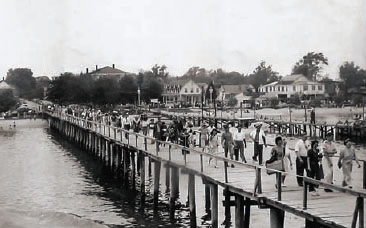
Departing for Washington, DC
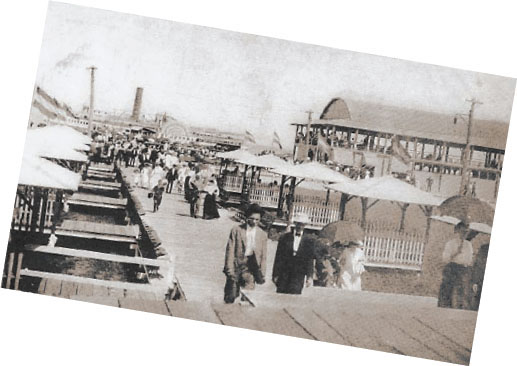
Arriving at Colonial Beach, 1920s
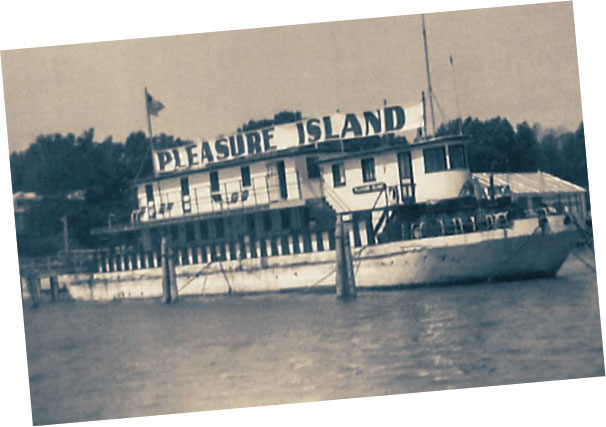
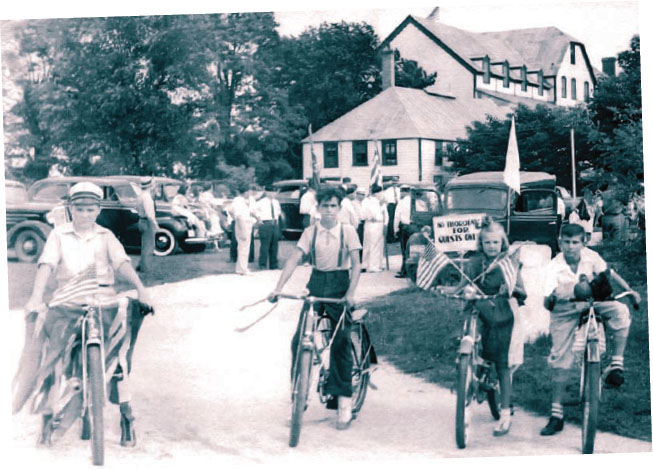
Waitstaff know our menu preferences. Neighbors know our habits. For example, following an accident not long ago, I failed to show up for breakfast at my favorite restaurant. The waitress, who’d grown up in Lenny’s under the guidance of her stepfather and mom, was concerned. Thanks to Brandy, five minutes after my usual arrival time, another regular customer was knocking on my door to make sure I hadn’t been seriously injured, to ask if I needed anything at all. This kind of salt-of-the-earth, genuine caring is something many of us in big cities find lacking in our lives and long for. I hear from readers all the time who can relate to that longing.
So, welcome to Colonial Beach! It’s rich with a unique history and charm and a whole slew of great storytellers. In these pages you’ll read about their lives, plus a little bit more about mine. None of us are historians and we’re not trying to document the past for the history books. Rather, we’re sharing pictures and personal stories from many of the phases that this town has experienced, of the people and places that live in our memories and need to be preserved.
I hope you’ll enjoy your virtual visit to Colonial Beach with me and that, by the end, you’ll understand just a little better why this town has been my inspiration…and the home of my heart.
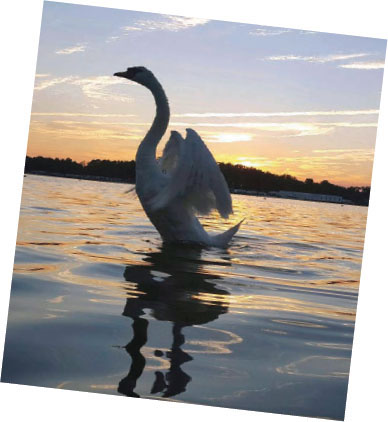
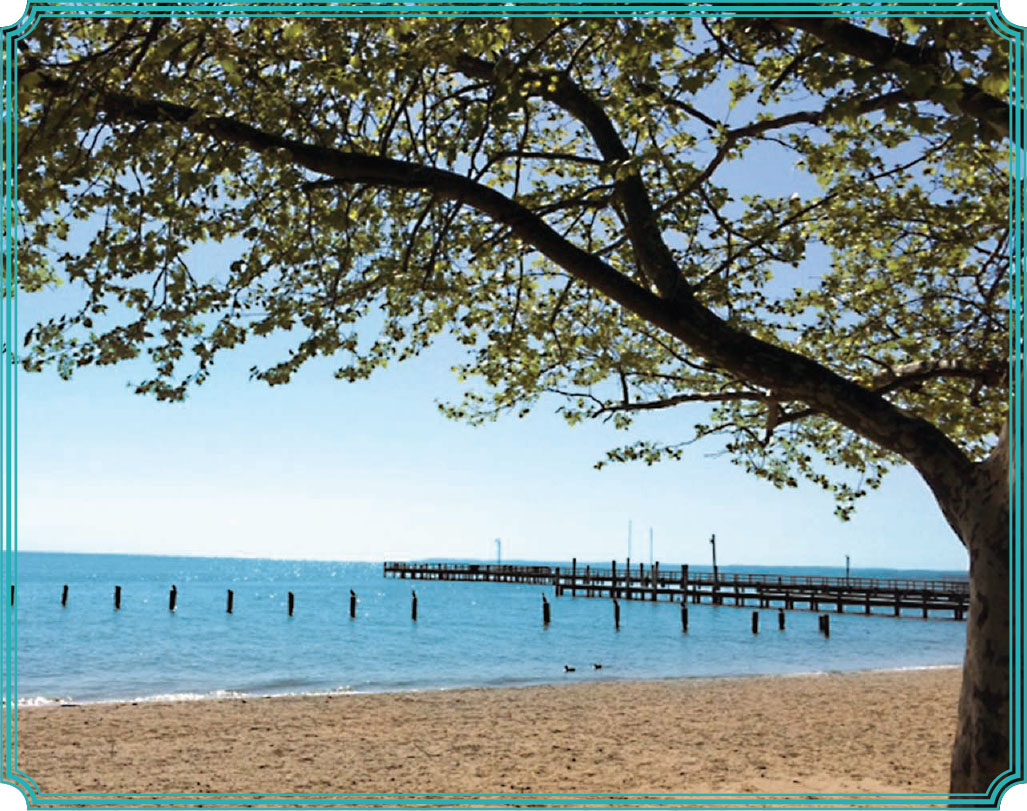
Конец ознакомительного фрагмента.
Текст предоставлен ООО «ЛитРес».
Прочитайте эту книгу целиком, купив полную легальную версию на ЛитРес.
Безопасно оплатить книгу можно банковской картой Visa, MasterCard, Maestro, со счета мобильного телефона, с платежного терминала, в салоне МТС или Связной, через PayPal, WebMoney, Яндекс.Деньги, QIWI Кошелек, бонусными картами или другим удобным Вам способом.




